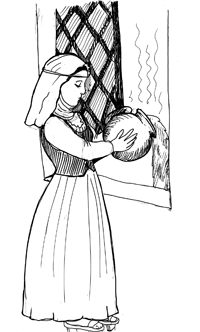STRANGE BUT TRUE- Bathe annually: Whether you need it or not!

DRAWING BY DEBORAH DERR McCLINTOCK
Q. In medieval Europe, chamber pots were emptied at day's end by dumping the contents out the window into the street below. When was indoor plumbing finally developed? –J. Beck/G. Cohen
A. Curiously, indoor plumbing was actually used many centuries earlier by the Romans, says psychologist Elliot Aronson in The Social Animal. But during the Middle Ages, a belief arose that nudity was sinful and subjected the body to evil spirits, so the Roman practice of daily bathing was abandoned and replaced by once-a-year baths. Over time, society lost the plumbing skills required to maintain indoor toilets, and thus the chamber pot was born of necessity.
The emptyings stayed in the street, breeding pestilence and disease, until a heavy rain came. But it would be some 500 years before anybody understood how unhealthy a practice this was– not until the "spirit" theory of disease gave way to the modern theory of bacteria and viruses.
Q. Using Einstein's famous e = m c(squared) on your body's mass, how much fundamental energy do you convert to? –A. Taylor
A. Assuming a nice round 100 kilograms (220 pounds) and plugging this into the equation, your body could theoretically yield some 2.5 trillion kilowatt-hours of pure energy, says Dr. Scott Berk on the "Please Pass the Science" website. Figuring on 350 kilowatt-hours of electricity to power a home for a month, your body could "light up" 7 billion homes.
"A month of free electricity for the whole world on just your 220-pounds! That's what I call charity!," Berk says.
While this is all cost prohibitive and unthinkable in terms of today's technology, it's kind of fun to imagine you're carrying around a mass powder keg that could single-handedly put a charge into the planet.
Q. Guess who in the family's got a coffee buzz, and for how long? –L. Provence
A. Caffeine's known for lingering in the bloodstream a lot longer for some drinkers than for others, says David Bodanis in The Secret Family.
The family dog, lapping from an unwatched cup, has deactivating mechanisms that will clear the caffeine twice as fast as its adult owners, in maybe five hours instead of 10. The experimental 10-year-old can't match the decaffeinating dog but also beats the grown-ups.
Is there a baby in the house? Having shared Mom's intake via breast-feeding, she/he will take a cranky 20 hours or more to tame blood caffeine levels.
"The younger the baby, the stronger the effect," Bodanis says, "which is why coffee drinking is not recommended to nursing parents who have any interest in sleep."
It's even worse for fetuses, for whom second-hand caffeine in coffee, tea or cola largely stays put, helping explain why "most babies born in America come out with measurable levels in their blood... and it's two to three weeks before it's all gone," he concludes.
Q. If ESP works, why aren't casino operators worried about it? –L. Channing
A. They've checked it out of course, because they watch their profits very closely, says John D. McGervey, author of Probabilities in Everyday Life. For example, in the game of "26," players pick a number from 1 to 6, and then ten dice are rolled from a cup. After 13 rolls, if their number comes up 26 times, they win.
The probability this will happen is about 5.3 percent. Is it better for those with "special powers"?
Tallies kept by the operators for years have shown no significant deviation from pure chance in these results. This leads to three possible conclusions:
1. People with ESP are too ethical to use their powers in casinos; 2. ESP doesn't work in casinos; 3. ESP doesn't exist.
So, pick a number.
~
Send Strange questions to brothers Bill and Rich at [email protected].
#